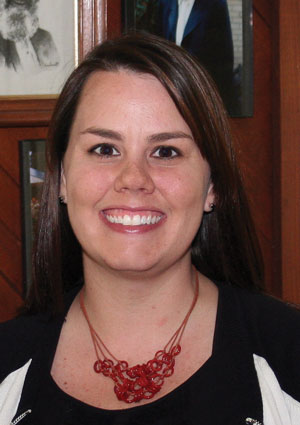According to the Centers for Disease Control and Prevention, 31 percent of people living with HIV in the United States are over the age of 50, and the number is growing. By 2015, half of the people living with HIV nationwide will be over 50 years old.
Research shows that these older adults have low levels of knowledge about how HIV is transmitted and the risk factors involved. Erin Robinson, a third-year doctoral student in the School of Social Work at the University of Iowa, believes health care providers can play a key role in communicating with older adults about AIDs transmission and its risk factors.

Robinson acknowledges that older adults can have an array of health issues, so their sexual health isn’t always a priority in conversions with doctors. She adds that there’s little research about how care providers can influence positive health behaviors among older adults, specifically regarding HIV prevention.
“I’m interested in using [health care providers] as a starting point to create tailored messaging to older adults about how they can prevent transmission of AIDS, such as using condoms, talking to your partner, and cleaning needles, if you’re a drug user,” says Robinson, who holds a master’s degree in public health from the University of Iowa as well as a master’s in social work from Washington University in St. Louis.
Outreach efforts
Robinson began doing HIV outreach work after earning her bachelor’s degree in social work at the University of Iowa in 2005.
She interned with the Johnson County Public Health Department in 2005-06, conducting HIV testing and educational outreach for injection drug users. She currently is doing HIV testing for the Public Health Department as a volunteer.
UI provides career planning and mentoring
Robinson is customizing her doctoral degree to give herself the best opportunity to become a social work professor in the future. This approach enabled her to earn a UI master’s of public health.
Training in public health “has made a tremendous impact on how I approach patient-provider communication around HIV/AIDS,” Robinson says. “It has allowed me to understand, from both a public health perspective and a social work mindset, the importance of intervening with the healthcare providers.”
Robinson says she is fortunate to have received quality mentoring from UI faculty, most notably Sara Sanders, associate professor of social work.
“I’ve had really good role models who have shown me high standards and what it likes look to be really good at what you do,” Robinson says. “Sara Sanders is an incredible person in mentoring students and helping them believe they have what it takes to reach their full potential.”
Sanders taught Robinson as an undergraduate and is now her dissertation advisor.
“It has been a pleasure working with Erin. Her potential leadership as a gerontological scholar is being recognized by others as she was awarded an AGE SW pre-dissertation fellowship, which connects her to leading researchers in the country,” Sanders says. “I see great things in Erin’s future.”